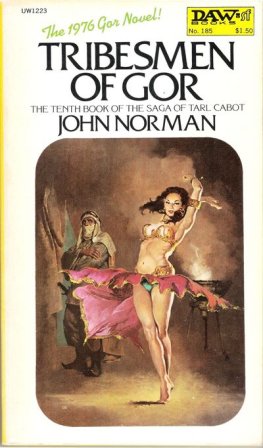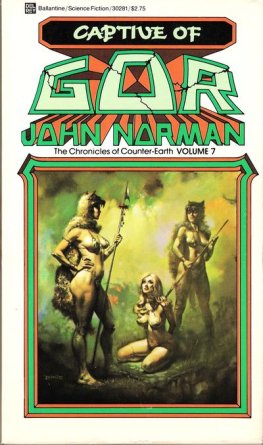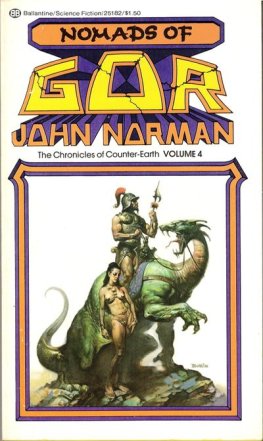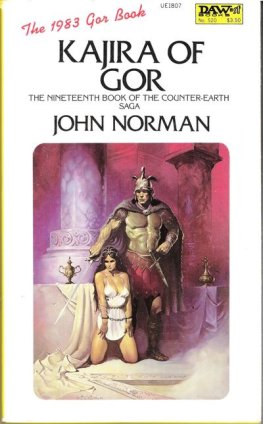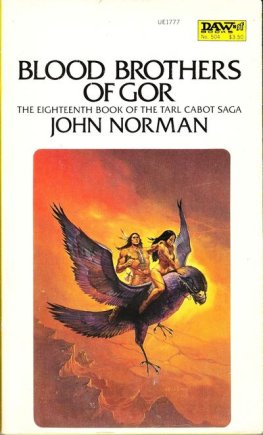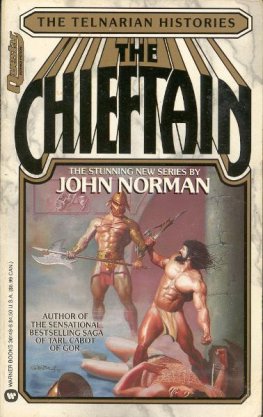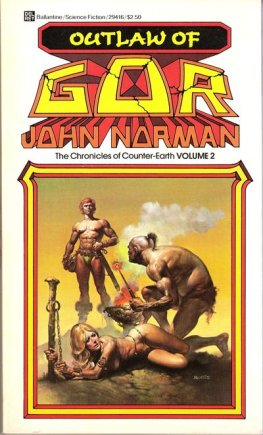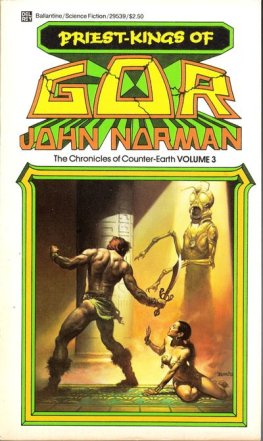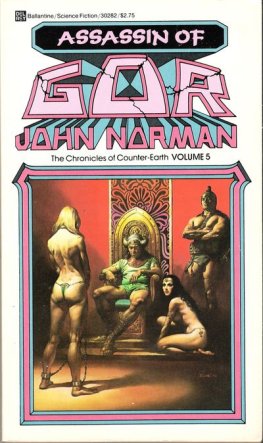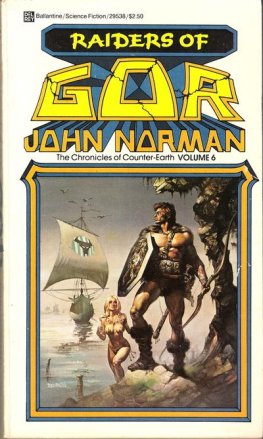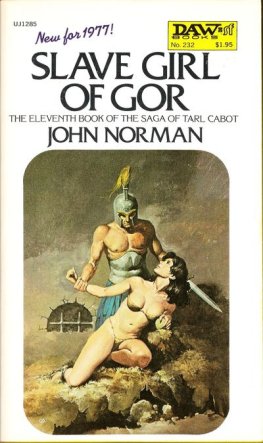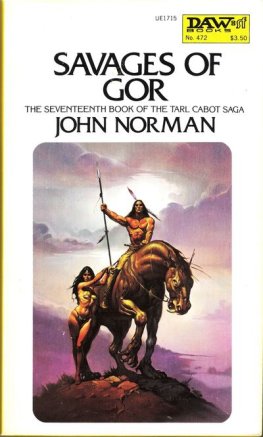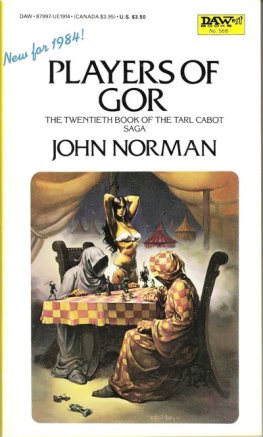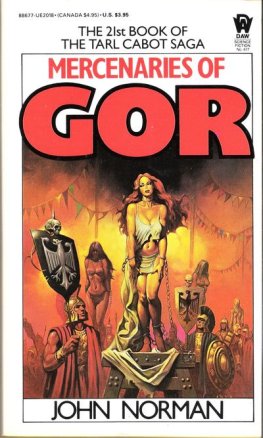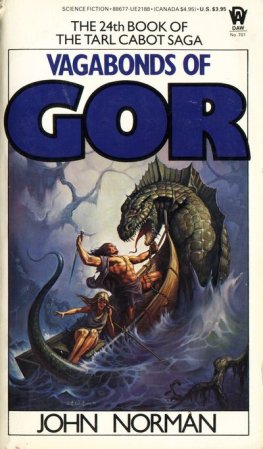TRIBESMEN OF GOR
(Volume ten of the Chronicles of Counter-Earth)
by John Norman
There were bells, three rows of them, small and golden, thonged tightly about the girls left ankle.
The entire floor of the chamber, shining, richly mosaiced, broad, reflecting the torchlight, was a map.
I watched the girl. Her knees were slightly bent. Her weight was on her heels, freeing her hips. Her rib cage was lifted, but her shoulders, relaxed, were down.
Her abdominal muscles, too were relaxed. Loose. Her chin was lifted, haughtily.
She did not deign to look at us. Dark hair flowed behind her.
There are many things I do not understand, said Samos to me. I reached for a slice of larma fruit and bit through it. Yet, said Samos, I think it is important that we come to the truth in this matter.
I regarded the vast map on the floor of the chamber. I could see, high on the map, Ax Glacier, Torvaldsland, and Hinjer and Skjern, and Helmutsport, and lower, Kassau and the great green forests, and the river Laurius, and Laura and Lydius, and lower, the islands, prominent among them Cos and Tyros; I saw the delta of Vosk, and Port Kar, and, inland, Ko-ro-ba, the Towers of the Morning, and Thentis, in the mountains of Thentis, famed for her tarn flocks; and, to the south, among many other cities, Tharna, of the vast silver mines; I saw the Voltai Range, and Glorious Ar, and the Cartius, and, far to the south, Turia, and near the shore of Thassa, the islands of Anango and Ianda, and on the coast, the free ports of Schendi and Bazi. There were, on the map, hundreds of cities, and promontories and peninsulas, and rivers and inland lakes and seas.
The left ankle of the girl, under the bells, the brown thong, the golden metal, was tanned.
Perhaps you are mistaken, I told him. Perhaps there is nothing to it.
Perhaps, he smiled.
At the corners of the room, helmeted, with spears, stood men-at-arms.
The girl wore Gorean dancing silk. It hung low upon her bared hips, and fell to her ankles. It was scarlet, diaphanous. A front corner of the silk was taken behind her and thrust loose and draped, into the rolled silk knotted about her hips; loosely, draped, into the rolled silk at her right hip. Low on her hips she wore a belt of small denomination, threaded, overlapping golden coins. A veil concealed her muchly from us, it thrust into the strap of the coined halter at her left shoulder, and into the coined belt at her right hip. On her arms she wore numerous armlets and bracelets. On the thumb and first finger of both her left and right hand were golden finger cymbals. On her throat was a collar.
I took another piece of larma fruit. I gather, I said, you have information?
Yes, said Samos. He clapped his hands. Immediately the girl stood beautifully, alert, before us, her arms high, wrists outward. The musicians, to one side, stirred, readying themselves. Their leader was a czehar player.
What is the nature of your information? I asked.
It is nothing definite, he said.
Perhaps it is not important, I suggested.
Perhaps not, he admitted.
Kurii, Others, I said, following the failure of the northern invasion of native Kurii, halted in Torvaldsland, have been quiet, have they not?
Beware of a silent enemy, said Samos. He looked at the girl. He clapped his hands, sharply.
There was a clear note of the finger cymbals, sharp, deliberate, bright, and the slave girl danced before us.
I regarded the coins threaded, overlapping, on her belt and halter. They took the firelight beautifully. They glinted, but were of small worth. One dresses such a woman in cheap coins; she is slave. Her hand moved to the veil at her right hip. Her head was turned away, as though unwilling and reluctant, yet knowing she must obey.
Come with me, said Samos.
I swilled down the last swallow of a goblet of paga.
He grinned at me. You may have her later, he said. She will dance from time to time during the evening.
Samos stepped from behind the low tables. He nodded his head to cup companions, trusted men. Two briefly clad, lovely female slaves withdrew before him, kneeling, heads down, their serving vessels in their hands.
To one side, stripped, bound tightly in black leather, hand and foot, straps crossing between her breasts and circling her thighs, to which her wrists were secured, in buckled cuffs, knelt a whitish-skinned girl, blond, frightened. Her shoulders, like those of most females of Earth, were tight, tense. The tone of her body, like that of most Earth women, was rigid, defensive. Like most others she had been acculterated in a thousand subtle ways to minimize, to conceal and deny the natural, organic sweetnesses of her musculature and structure, conditioned into a dignified, formal physical neutership, the stiffness, reserve and tightness so much approved of in females in a mechanistic, industrial, technological society, in which machines govern and present the symbols and paradigms of movement, understood as repetition, measure, regularity, precision and function. Human beings move differently in a technological society than in a non-technological society; they hold their bodies differently; a man or womans acculturation is visible in their demeanor. Few people understand this; most view as natural motions and body positions, which are the consequences of a subconsciously conditioned, mechanistic ballet, a choreography of puppets, imitating the models, the stridences, in which they find themselves enmeshed.
Yet, somewhere beneath the conditioned behavior lies the animal, which moved naturally before there was a civilization to teach it the proprieties of mechanism. It is little wonder that the Earth human, when unobserved, even the adult, sometimes throws itself on the ground and rolls and cries out, if only to feel the joy of its own movement, the unleashing of the tensions inflicted by the rigidities of the civilized restraints. Invisible chains are those which weigh the most heavily.
I looked down at the girl. She was terrified, miserable. Tell her, said Samos, to watch a true woman, and learn to be female. He indicated the Gorean dancer.
The girl had not been long on Gor. Samos had purchased her for four silver tarsks on Teletus, with many others, for various amounts. This was the first time out of the pens for her in his house. She wore her brand on the left thigh.
A simple band of iron had been hammered about her neck by one of the metal workers in the employ of Samos. She was poor stuff, not fit for a lock collar. I probably would have sold her for a kettle girl. Yet, looking more carefully upon her, examining her with candor, as she looked away, miserable, I saw that she might not be without promise. Perhaps she could be taught. The basic characteristic expected of a Gorean woman is, interestingly, femaleness; this is, I note, certainly not the basic characteristic requested of an Earth woman; indeed, femaleness in a woman of Earth, as I recalled, was societally discouraged, it complicating the politically expedient neuterlike relationships valuable in a technologically sophisticated social structure, to which sexual relationships were irrelevant, if not inimical. Western industrialized societies on Earth optimally would be manned by metal creatures, sexless, smoothly functioning, programmed to tend preserve and replicate the metal society. Man, on Earth, had finally succeeded, after long centuries, in creating a society in which he had no essential place; he had, at last, built a house in which he could not live, in which he had left not one room suitable for human habitation; he called it a home; in it he was a stranger; his habitat, by his own efforts, became inhospitable to himself; his efficiencies, his machines, his institutions, in his own hands, had at last succeeded in evicting himself from his own realities; women were shamed to be women; men terrified of listening to their blood, and being men; in their plastic cubicles, amidst the hum of their machineries, men at night squirmed and wept, hating themselves, castigating themselves for not meeting the standards of a world alien to their sensate truths; let robots weep for not being men, not men weep for not being robots; the strong, the fine, the mighty, is not wicked; only the vile and small, incapable of power, speak it so; but there was little hope for the men of Earth; they feared to listen, for they might hear ancient drums.

